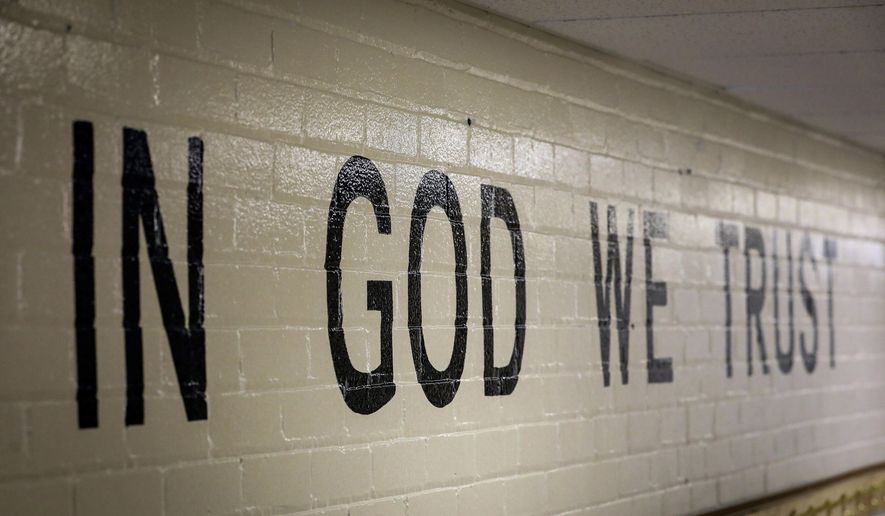RAPID CITY, S.D. | Students returning to Beadle Elementary School in Rapid City will find a squeaky clean new gymnasium floor, tall sunflowers in the community garden — and the motto “In God We Trust” painted above the scoreboard.
They won’t be alone. Students in each of the Mount Rushmore State’s public schools will see the official national motto, which supplanted “E Pluribus Unum” by congressional action in the 1950s, posted on school property, complying with a law signed this spring by Gov. Kristi Noem.
“We should never be afraid to proclaim that we are one nation under God,” Ms. Noem tweeted last month.
The new state law requires the school display to be bigger than 1-foot-square and located in a “prominent” location.
South Dakota joins more than half-dozen states where “In God We Trust” is emblazoned on public schools walls, thanks to legislation written by Project Blitz, a legislative outreach by the Congressional Prayer Caucus Foundation, which has backed bills ranging from required classes on the Old and New Testaments to strictures against transgender-friendly school policies and curricula.
A spokesperson for South Dakota Attorney General Jason Ravnsborg said “In God We Trust” is not an unconstitutional endorsement of religion, noting that the Senate reaffirmed the phrase twice in the last 15 years.
While the legislation passed with wide margins in the Republican-controlled South Dakota Legislature, not every student was pleased. Some at Stevens High School approached the Rapid City Area Board of Education this spring with an alternate version of the display they said would be more inclusive, including references to Buddha, Yahweh, Allah and science.
“There will be students who feel left out [with the current design],” said rising senior Noelle Schendzielos, 17, who is the daughter of two pastors and considers herself spiritual but doesn’t classify herself as Christian. “Adding onto [the design] is important because America is a country built on the idea of differences. We have different ethnicities, faiths, ideas, and as a future generation we should learn to accept each other with different beliefs and coexist.”
The board rejected the students’ proposal.
“We followed the letter of the law,” school board President Mike Roesler told The Washington Times. “We looked at the statute, and it says we can post ’In God We Trust’ [only].”
“In God We Trust” began appearing on U.S. coinage in 1864, though the phrase wasn’t adopted by Congress as the national motto until the 1950s during the height of fears over the Soviet Union, whose communist government was officially atheistic.
South Dakota is hardly alone in adding the slogan to public infrastructure. The phrase appears on Indiana license plates; on police cars in Bakersfield, California; and in every school auditorium, cafeteria and classroom in Mississippi. This spring, Kentucky Gov. Matt Bevin also signed legislation requiring the national motto be displayed in public schools.
The Congressional Prayer Caucus Foundation says the phrase rallies an American patriotism rooted in monotheism.
Nearly 80% of Americans believe — at least broadly — in God, according to a 2018 survey by the Pew Research Center. However, just over half of those Americans surveyed believe in God as described in the Bible.
State Rep. Phil Jensen, Rapid City Republican, told the Argus leader he was moved to introduce the South Dakota legislation after seeing “In God We Trust” on car window decals, adding that the phrase can inspire struggling students with a “flicker of hope.”
The state Legislature did not appropriate any funding for the motto’s application in schools. The law allows schools to use projects such as a “mounted plaque, student artwork, or any other appropriate form determined by the school principal.”
• Christopher Vondracek can be reached at cvondracek@washingtontimes.com.




Please read our comment policy before commenting.